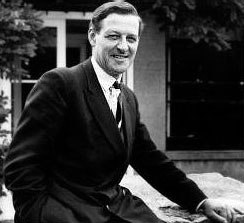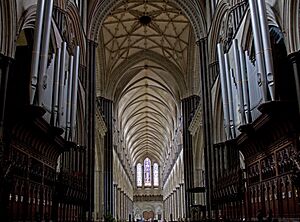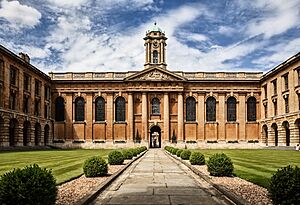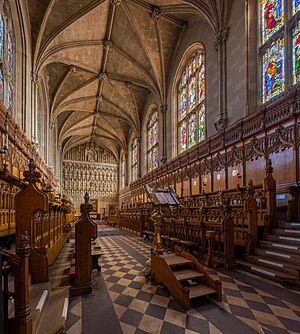Bernard Rose (musician) facts for kids
Quick facts for kids
Bernard Rose
OBE FRCO
|
|
|---|---|
 |
|
| Born |
Bernard William George Rose
9 May 1916 Sawbridgeworth, England
|
| Died | 21 November 1996 (aged 80) Bampton, Oxfordshire, England
|
| Occupation | Organist, music tutor |
| Era | 20th-century music |
| Known for | Anglican church music |
| Spouse(s) | |
| Children | 3, including Gregory |
Bernard William George Rose (9 May 1916 – 21 November 1996) was a talented British organist, a brave soldier, a composer, and a university teacher.
He is especially known for his beautiful church music, like his "Preces and Responses," which are still sung in many churches today. Bernard Rose also served in World War II and later became a famous choir leader and music teacher. Some of his students became well-known musicians and even actors, like Dudley Moore.
Contents
Learning Music and Beyond
Bernard Rose began his musical journey at Salisbury Cathedral School. From 1925 to 1931, he sang as a chorister (a choir singer) at Salisbury Cathedral. He also learned to play the organ there. By the age of 15, he was already an assistant organist at the cathedral!
From 1933 to 1935, Bernard studied at the Royal College of Music. He continued his organ studies and then won a special scholarship to St Catharine's College, Cambridge in 1935. At Cambridge, he studied music until 1939.
Life and Career
Bernard Rose started teaching music at The Queen's College, Oxford. He became the organist there and led a music society. Just as he was starting this new role, World War II began. In December 1939, he married his fiancée, Molly Marshall.
Serving in the War
Bernard Rose joined the army in September 1940. He became an officer and fought in North Africa and Italy as a "Desert Rat." He was also part of the Normandy landings on D-Day, 6 June 1944.
A week later, his wife Molly was told he had been killed. But Bernard had actually been captured by German forces on 13 June 1944 during the Battle of Villers-Bocage. He spent the rest of the war in a German prisoner-of-war (POW) camp until he was freed in April 1945. He left the army as a captain.
Bernard's wife, Molly Rose, also helped during the war. She was a pilot for the Air Transport Auxiliary, flying different types of planes like Spitfires and Wellington bombers to deliver them where they were needed.
After the War
After the war, Bernard Rose returned to teaching at The Queen's College in 1945. Later, in 1957, he became the main organist and choirmaster at Magdalen College. He was very popular as a teacher, especially for harmony and counterpoint (ways of putting musical notes together).
Many of his students became successful musicians, including Dudley Moore (the actor and musician) and Harry Christophers, who founded the famous choir The Sixteen. Bernard also helped edit important musical works, like Handel's Susanna.
In 1952, Bernard Rose conducted the first performance of "An Oxford Elegy" by the famous composer Ralph Vaughan Williams. He also helped connect his student Kenneth Leighton with another composer, Gerald Finzi, leading to a strong friendship and musical partnership.
Bernard Rose was also the president of the Royal College of Organists from 1974 to 1976.
Awards and Recognition
In 1980, Bernard Rose was awarded the Officer of the Order of the British Empire (OBE) for his great contributions to music. His wife, Molly, also became well-known for her wartime flying, sharing her stories in seminars and TV shows.
His Lasting Impact
Bernard Rose's dedication to excellent choir singing at Magdalen Chapel had a huge impact. He inspired many of Britain's top choirs, such as The Sixteen and The Tallis Scholars.
In 2010, Bernard Rose's son, Graham, found old tape recordings of the Magdalen College Choir led by his father from 1960 to 1976. These recordings were made into a CD in 2015 to celebrate 100 years since Bernard's birth.
A feature film called Attagirls is being developed about the wartime lives of Molly and Bernard. A book based on the film's story is also planned. A special scholarship, the Molly Rose Pilot Scholarship, has been created to encourage young women to become pilots, inspired by Molly's bravery.
Some of His Music
Bernard Rose wrote many pieces of music, especially for choirs and organs. Here are a few examples:
- Slow, slow fresh fount (words by Ben Jonson)
- Symphony in A minor
- Praise ye the Lord (Psalm 149)
- Preces and Responses (two different sets)
- Evening Canticles (three different sets)
- Our blessed lady's lullaby
- Chimes (for organ)
- Feast Song for Saint Cecilia
- O Praise God in his holiness (Psalm 150)
- A Magdalen Mass




